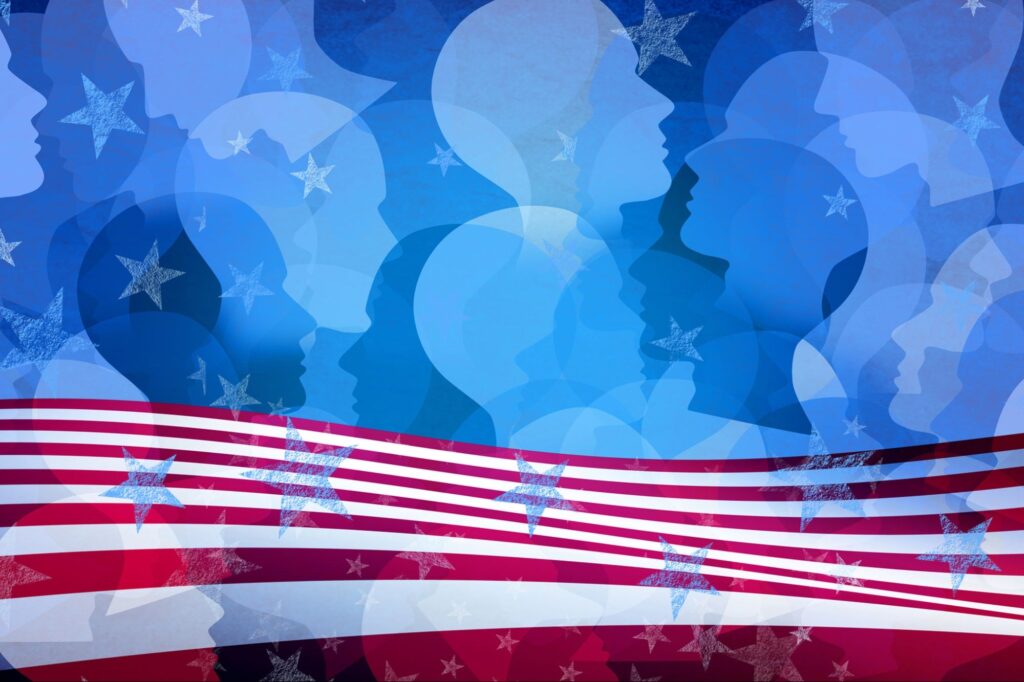Entrepreneur
With Election Day in our rearview mirrors and Inauguration Day around the corner, no matter where you sit in the world, I think we can all agree that the showdown between Kamala Harris and Donald Trump, short though it was, ranks up there with one of the most divisive in U.S. history.
And, mind you, Americans are no strangers to divisive elections. When incumbent John Adams ran against (and lost to) Thomas Jefferson in 1800, they may not have resorted to the coarse language Harris and Trump used against the other, but things got contentious nonetheless with accusations, aggressive rhetoric, and multiple personal attacks that came from both sides.
Subsequent elections between Rutherford B. Hayes and Samuel Tilden in 1876 along with the ones between George W. Bush and Al Gore in 2000 and 2016’s Hillary Clinton and Donald Trump showdowns, continued the tradition of contentious elections.
But for the American people, this wasn’t just a fight between the two candidates running for the presidency; it was much of a blood thirst as the rivalries between favored football, basketball, hockey and baseball teams.
Whether it was the media inciting rage and divisiveness or the candidates and their parties themselves driving things, the American people are accustomed to joining their preferred candidate on the battlefields of social media and volunteering for in-person debates.
And this isn’t hyperbole when I refer to how American voters show their support. I often liken the road to democracy to an African proverb: “When elephants fight, it is the grass that suffers.” In other words, the collateral damage for the voters duking it out is extensive (fractured relationships, constant strife and stress, etc.).
But, as Americans are so fond of saying, “Go big or go home!” This can apply to sports and politics!
Approximately 153 million voters cast their ballots (by mail or at the ballots), with former President Donald Trump tipping the scales.
Indeed, things had been contentious when incumbent president Joe Biden was running against former president Donald Trump. However, once Kamala Harris threw her hat in the ring in mid-July to replace President Biden on the Democratic ticket, things quickly went from bad to ugly.
With less than two weeks until Donald Trump is sworn in as the U.S.’s 47th president, much of the nation is still in mourning, while nearly 77 million voters continue to gloat. However, for small business owners, you have to try and see things differently from the political drama of the hot-button issues. Whether your chosen candidate won or didn’t, it’s an opportunity to examine how policies will shift and what this could mean for the health of your business.
Ten days prior to the election, I wrote about how small businesses should vote. I encouraged small to medium businesses (SMBs) to consider not just how each candidate’s campaign promises affected them on a personal level, but I advocated for voting based on strategy over sentiment — a lesson that’s crucial now as we look ahead to new regulations, economic policies, and healthcare priorities.
Related: Why Donald Trump’s Business-First Policies Trump Harris’ Consumer-Centric Approach
The big picture: planning for business, not politics
As the U.S. moves forward, the easy thing to do is to get wrapped up in the headlines. But remember, headlines are meant to incite and divide. And nothing the headlines have to say will reflect what must go through the minds of every SMB owner.
It may be difficult to remember that your business priorities don’t change with each new administration. For small business owners, voting should always be about strategy, not a knee-jerk reaction to how you feel about the x, y or z hot-button issue.
This is particularly true when policies that could determine how effectively you can respond to market conditions, your ability to attract talent, and provide competitive benefits are at stake. As I tell my clients all the time, inauguration Day isn’t about party allegiance; it’s about building a resilient business capable of weathering policy changes, economic fluctuations, and industry-specific challenges.
Lessons from the field: resilience in action
Prior to becoming a strategic advisor to Fortune 100 companies and many SMBs, I worked in high-level advisory roles in democratic development, strategic planning and conflict resolution in Iraq, Jordan and Indonesia.
As Governance Director in Iraq during the second Gulf War, I advised political leaders and committees on creating sustainable governance strategies. As a Political Advisor in Jordan, I provided guidance on message development, media relations, and strengthening democratic institutions. As CEO of WealthFunds SPC in Indonesia, I led asset management, expanded international partnerships, and drove strategic initiatives.
These experiences in politically sensitive and transformative environments shaped my Optimize the Moment framework, emphasizing resilience and strategic action in complex situations.
The principle of Optimize the Moment, which I detail in my book, From War Zones to Boardrooms: Optimize the Moment When Strategic Planning Fails, stems not from political divides but from real experiences in conflict and post-conflict zones around the world. Whether in Jordan, Iraq, Ukraine or Indonesia, I’ve seen the profound resilience of people united by purpose, not ideology, or in this case, politics.
I raise this because, in all instances, I worked with people following the worst days of their lives. Loss of limbs, homes, communities and family members. Despite these incredible losses, one thing that everyone I worked with had in common was that they didn’t let anything stand in the way of rebuilding their country and communities.
It didn’t matter which side of the conflict they were on. Not only did they show up each day for the common good of the community, but in their grief and anger, they inspired others to do the same. They saw the necessity of moving forward, no matter what their feelings were during the conflicts.
Related: The 2024 Election Will Determine How AI Impacts Your Business. Here’s What Entrepreneurs Must Do to Prepare.
Shiney shoes for the win!
In Jordan, I had an experience that profoundly illustrated the power of unity amidst hardship and differences in thoughts and beliefs. My colleague scheduled an early morning meeting… on a Saturday, no less. I couldn’t have imagined more than a handful showing up, but I was surprised to find a group of retired veterans waiting.
Inside were about 50 retired military veterans. Everyone was punctual and brimming with enthusiasm, and I observed something very cool that united them. All of them wore shoes with a high shine!
As we discussed the project and shared ideas, their drive was evident. Their motivation was boundless. Their nationwide connections became invaluable. This group, with their zeal and time at hand, was perfect for the task. Their willingness to help without expecting any financial gains made the whole experience remarkable.
And yes, at every subsequent meeting, each wore their old military shoes, polished to a high shine, a practice they had maintained as a symbol of dignity and resilience, even after leaving service. These veterans had lost nearly everything — family, friends, stability — due to the region’s ongoing conflicts. Yet, they showed up, shoes gleaming, as a statement of their commitment to something larger than themselves.
Upon completing our project, these veterans gave me a ring as a gift. They told me, ‘Whenever you’re in Jordan, wear this.’ I expressed my gratitude, but my colleague clarified its significance.
‘That ring,’ he said, ‘is more than just jewelry here.’ True to his words, whenever I approached a checkpoint or interacted with authorities, a glimpse of that ring would ensure my passage. Once again, I was deeply humbled. It continues to remind me that we all can unite around differences for the greater good.
Related: ‘I Have a Better Instinct’: Donald Trump Says He Doesn’t ‘See’ Replacing Federal Reserve Chair Jerome Powell
The messy yet powerful nature of democracy
During my deployment to Ukraine during the Orange Revolution, I watched as women voted for the first time, exercising their voice in a new system that was also turbulent and full of promise.
Does this remind you of the first time you were eligible to vote? Can you recall the discussions you got into as a new voter and now? I remember listening to all sides so I could make an informed decision. I loved the diversity of thought and was less interested in uniformity. Uniformity is great for people who need echo chambers, but it doesn’t move democracy forward, and it certainly doesn’t move your business forward.
Anecdotes such as the one in Jordan are ones I use in my practice when advising clients, particularly when they express concerns about which direction to turn both during their day-to-day operations, but particularly during a crisis.
As a business owner, viewing Inauguration Day through this lens allows you to embrace change, prepare for shifts, and see every challenge as an opportunity.
I marvel at times when I hear the word bipartisan. If people who came from different ideological and political beliefs could unite around their shared vision of moving democracy forward, I have to believe we as people can do the same. I have to believe that small business owners can inspire their team members, stakeholders and customers to unite for the common good of seeing the company grow and continue providing services and products.
As we approach Inauguration Day and the next four years, I encourage entrepreneurs to remember that their role is not just as individuals whose candidate either won or didn’t but as SMB owners with an eye on success. The media lives to divide us, but your ability to see past the noise of the day will impact not only your business but also your employees, customers, stakeholders and community members who rely on you.
Read the full article here












